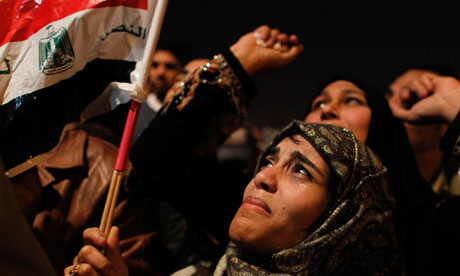 |
| Photograph: Tara Todras-Whitehill/AP |
The slate is wiped clean! I truly feel that this victory for the Egyptian people is a victory for us all. What a beautiful moment, that of freedom, choice and an opening to bring about a vision held by so many.
When I sit and close my eyes, I can taste a little of what the Egyptians may be feeling right now. I imagine having a government that I don't agree with and feel the weight of constraint. Then I feel what it must be like to gather with my brothers and sisters, family and country relations and come together with a vision for a new tomorrow and a different way of life. Followed by days of speaking truth as one, gathering and collaborating, holding that vision to be true and attainable. And then that moment, the one where Mubarak says goodbye. Feeling the upwelling of excitement and the recently seeded possibilities of a future I helped create through collective protest and voice. It's like my heart is broken open and everything is rushing through it.
I spent time reading some articles about the role of social media in organizing this revolution. Thanks to those people in my network that are posting their findings to Facebook and have e-mailed me articles they found. It's amazing to see what a group of dedicated individuals can catalyze. In New York Times' "Wired and Shrewd, Young Egyptians Guide Revolt", writer David Kirkpatrick summarizes the way Egyptian youth organized:
...[t]hey brought a sophistication and professionalism to their cause — exploiting the anonymity of the Internet to elude the secret police, planting false rumors to fool police spies, staging “field tests” in Cairo slums before laying out their battle plans, then planning a weekly protest schedule to save their firepower — that helps explain the surprising resilience of the uprising they began.Protesters organized by Facebook pages and events and through Twitter. Youth staged events to test their tactics in marching through the streets and gathering people to protest in neighborhoods. Google Executive, Wael Ghonim, who was detained for 12 days due to organizing against the Mubarak regime, was quoted as saying, "If you want to liberate a government, give them the internet.”
Ultimately, this was an effort of people coming together to stand up for something they believe in strongly. As Jerome Socolovsky reports from Cairo for VOA News in the story "Egyptian Youth Vow to Transform Their Society":
Fadi Awad has been here since uprising started on January 25. The 32-year-old said, "Now when you look in the eyes of people you see happiness, you see intelligence, and you see acceptance of the other - all the others, inside or outside,” said Awad. “I guess Egypt is going to be a great country after all, I hope."David Porter, of CommonDreams.org, eloquently discusses the organic evolution of the movement and "Leaderless Revolution". "The slowly-accumulating momentum of hundreds of thousands of confrontations with local officials and elites ... slowly develop the courage, confidence and essential horizontal networks bubbling below the surface of seemingly fixed political landscapes."
Now that Mubarak has left the country, what now?
Commenter "Hamad" left an observation on the VOA News story, "Those youth protesters who are helping each other and have been seen sweeping the street, picking up garbage, while sharing food, water and medications do you think they will leave their country to fall in Chaos, if Mubarak and his regime step down now. I do not think so."
My colleague, Susan, commented that "youth need to move to a new level of organization and purpose…. They need to protect this potential to have a free government." I agree with this statement. Through the events that transpired since January 25, they show the opportunity and passion for a new way of being and governing in Egypt. I send all my encouragement for the youth to continue to fight for the Egypt they envision.